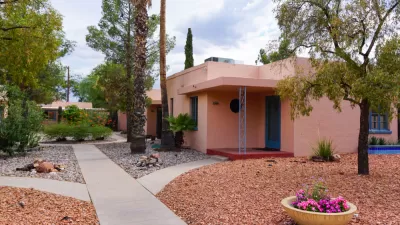The city could ban the planting of “nonfunctional” grass in new developments, but would stop short of regulating lawns and golf courses.

A Tucson proposal could ban “nonfunctional” grass planting in some developments, reports Tony Davis in the Arizona Daily Star, following in the footsteps of cities like Las Vegas as the West’s water shortage continues.
Councilman Kevin Dahl, who supports the legislation, defined nonfunctional grass as “any irrigated grass area not providing functional use, such as grass along streets in strip malls, shopping centers, and businesses, and also turf managed by an HOA (a homeowners association) that does not provide recreational value for people or pets.”
Davis notes that the ban would not extend to new single-family neighborhoods, parks, school playgrounds, or golf courses, which some critics say doesn’t go far enough. Others worry that the vague and subjective definition of “nonfunctional” could make the ban difficult to enforce.
Tucson officials are working with other cities in the region to come up with a water conservation plan by November 15, but have not signed on to the current plan yet. “Among other things, the proposal now calls for a program ‘to reduce the quantity of nonfunctional turf grass by 30% through replacement with drought- and climate-resilient landscaping, while maintaining vital urban landscapes and tree canopies that benefit our communities, wildlife, and the environment.’”
In Southern Nevada, in the water district that includes Las Vegas, development codes prohibit “any grass in new construction of commercial developments and the front yards of new single-family home developments.” In Colorado, the Castle Rock town council voted to ban grass lawns in the front yards of new homes and limit grass turf lawns to 500 square feet in backyards, just a month after Aurora passed a similar law.
FULL STORY: "Ornamental"grass could soon be banned in some Tucson developments

Maui's Vacation Rental Debate Turns Ugly
Verbal attacks, misinformation campaigns and fistfights plague a high-stakes debate to convert thousands of vacation rentals into long-term housing.

Planetizen Federal Action Tracker
A weekly monitor of how Trump’s orders and actions are impacting planners and planning in America.

In Urban Planning, AI Prompting Could be the New Design Thinking
Creativity has long been key to great urban design. What if we see AI as our new creative partner?

King County Supportive Housing Program Offers Hope for Unhoused Residents
The county is taking a ‘Housing First’ approach that prioritizes getting people into housing, then offering wraparound supportive services.

Researchers Use AI to Get Clearer Picture of US Housing
Analysts are using artificial intelligence to supercharge their research by allowing them to comb through data faster. Though these AI tools can be error prone, they save time and housing researchers are optimistic about the future.

Making Shared Micromobility More Inclusive
Cities and shared mobility system operators can do more to include people with disabilities in planning and operations, per a new report.
Urban Design for Planners 1: Software Tools
This six-course series explores essential urban design concepts using open source software and equips planners with the tools they need to participate fully in the urban design process.
Planning for Universal Design
Learn the tools for implementing Universal Design in planning regulations.
planning NEXT
Appalachian Highlands Housing Partners
Mpact (founded as Rail~Volution)
City of Camden Redevelopment Agency
City of Astoria
City of Portland
City of Laramie





























